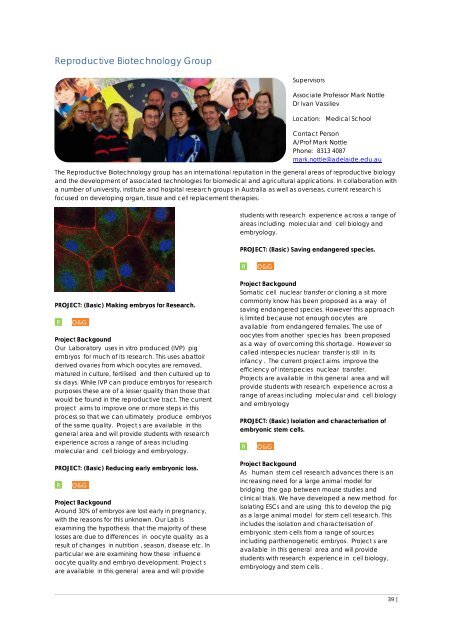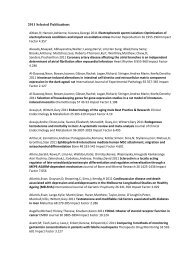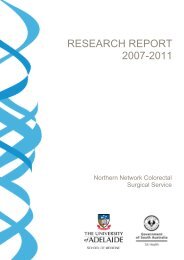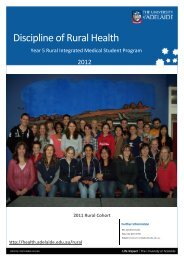Honours Project Book - Faculty of Health Sciences - University of ...
Honours Project Book - Faculty of Health Sciences - University of ...
Honours Project Book - Faculty of Health Sciences - University of ...
Create successful ePaper yourself
Turn your PDF publications into a flip-book with our unique Google optimized e-Paper software.
Reproductive Biotechnology Group<br />
Supervisors<br />
Associate Pr<strong>of</strong>essor Mark Nottle<br />
Dr Ivan Vassiliev<br />
Location: Medical School<br />
Contact Person<br />
A/Pr<strong>of</strong> Mark Nottle<br />
Phone: 8313 4087<br />
mark.nottle@adelaide.edu.au<br />
The Reproductive Biotechnology group has an international reputation in the general areas <strong>of</strong> reproductive biology<br />
and the development <strong>of</strong> associated technologies for biomedical and agricultural applications. In collaboration with<br />
a number <strong>of</strong> university, institute and hospital research groups in Australia as well as overseas, current research is<br />
focused on developing organ, tissue and cell replacement therapies.<br />
PROJECT: (Basic) Making embryos for Research.<br />
R. O&G.<br />
<strong>Project</strong> Backgound<br />
Our Laboratory uses in vitro produced (IVP) pig<br />
embryos for much <strong>of</strong> its research. This uses abattoir<br />
derived ovaries from which oocytes are removed,<br />
matured in culture, fertilised and then cultured up to<br />
six days. While IVP can produce embryos for research<br />
purposes these are <strong>of</strong> a lesser quality than those that<br />
would be found in the reproductive tract. The current<br />
project aims to improve one or more steps in this<br />
process so that we can ultimately produce embryos<br />
<strong>of</strong> the same quality. <strong>Project</strong> s are available in this<br />
general area and will provide students with research<br />
experience across a range <strong>of</strong> areas including<br />
molecular and cell biology and embryology.<br />
PROJECT: (Basic) Reducing early embryonic loss.<br />
R. O&G.<br />
<strong>Project</strong> Backgound<br />
Around 30% <strong>of</strong> embryos are lost early in pregnancy,<br />
with the reasons for this unknown. Our Lab is<br />
examining the hypothesis that the majority <strong>of</strong> these<br />
losses are due to differences in oocyte quality as a<br />
result <strong>of</strong> changes in nutrition , season, disease etc. In<br />
particular we are examining how these influence<br />
oocyte quality and embryo development. <strong>Project</strong> s<br />
are available in this general area and will provide<br />
students with research experience across a range <strong>of</strong><br />
areas including molecular and cell biology and<br />
embryology.<br />
PROJECT: (Basic) Saving endangered species.<br />
R. O&G.<br />
<strong>Project</strong> Backgound<br />
Somatic cell nuclear transfer or cloning a sit more<br />
commonly know has been proposed as a way <strong>of</strong><br />
saving endangered species. However this approach<br />
is limited because not enough oocytes are<br />
available from endangered females. The use <strong>of</strong><br />
oocytes from another species has been proposed<br />
as a way <strong>of</strong> overcoming this shortage. However so<br />
called interspecies nuclear transfer is still in its<br />
infancy . The current project aims improve the<br />
efficiency <strong>of</strong> interspecies nuclear transfer.<br />
<strong>Project</strong>s are available in this general area and will<br />
provide students with research experience across a<br />
range <strong>of</strong> areas including molecular and cell biology<br />
and embryology<br />
PROJECT: (Basic) Isolation and characterisation <strong>of</strong><br />
embryonic stem cells.<br />
R. O&G.<br />
<strong>Project</strong> Backgound<br />
As human stem cell research advances there is an<br />
increasing need for a large animal model for<br />
bridging the gap between mouse studies and<br />
clinical trials. We have developed a new method for<br />
isolating ESCs and are using this to develop the pig<br />
as a large animal model for stem cell research. This<br />
includes the isolation and characterisation <strong>of</strong><br />
embryonic stem cells from a range <strong>of</strong> sources<br />
including parthenogenetic embryos. <strong>Project</strong> s are<br />
available in this general area and will provide<br />
students with research experience in cell biology,<br />
embryology and stem cells .<br />
39 |





